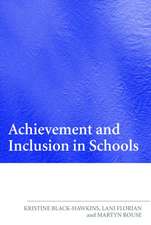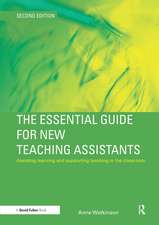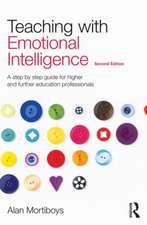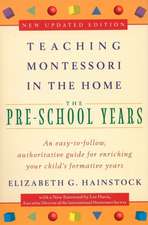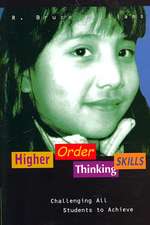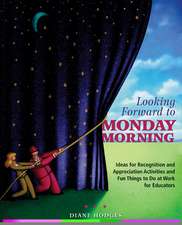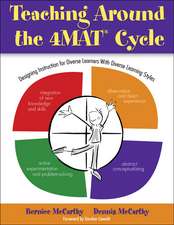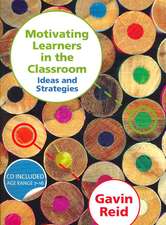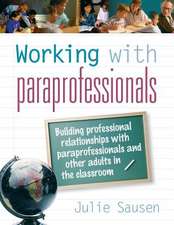Research on Educational Innovations
Autor Arthur K. Ellis, John B. Bonden Limba Engleză Paperback – 9 iun 2016
Features and Updates to the New Edition include:
•Framework provides clarity to the research process, helping both experts and novices in the field make reasonable assessments as consumers
•A fully revised and updated chapter on brain research provides an overview of the unfolding research applications of neuroscience to education.
•Snapshots features offer brief summaries of highly current topics such as problem-based learning, flipped classrooms, reflective assessment, and curriculum integration.
| Toate formatele și edițiile | Preț | Express |
|---|---|---|
| Paperback (1) | 386.13 lei 6-8 săpt. | |
| Taylor & Francis – 9 iun 2016 | 386.13 lei 6-8 săpt. | |
| Hardback (1) | 786.38 lei 6-8 săpt. | |
| Taylor & Francis – 16 iun 2016 | 786.38 lei 6-8 săpt. |
Preț: 386.13 lei
Nou
Puncte Express: 579
Preț estimativ în valută:
73.91€ • 80.31$ • 62.12£
73.91€ • 80.31$ • 62.12£
Carte tipărită la comandă
Livrare economică 21 aprilie-05 mai
Preluare comenzi: 021 569.72.76
Specificații
ISBN-13: 9781138671225
ISBN-10: 1138671223
Pagini: 210
Ilustrații: 26
Dimensiuni: 178 x 254 x 16 mm
Greutate: 0.38 kg
Ediția:Revised
Editura: Taylor & Francis
Colecția Routledge
Locul publicării:Oxford, United Kingdom
ISBN-10: 1138671223
Pagini: 210
Ilustrații: 26
Dimensiuni: 178 x 254 x 16 mm
Greutate: 0.38 kg
Ediția:Revised
Editura: Taylor & Francis
Colecția Routledge
Locul publicării:Oxford, United Kingdom
Public țintă
ProfessionalCuprins
Table of Contents
1. Innovation Defined and Described
2. What Research is of Most Worth?
-Scientifically-Based, Evidence-Based, or What?
-The Current Scene
-Conclusion
3. Nature of Educational Innovation
-What is Innovation?
-Where are They Now?
-Research Based?
-How Educational Theories Develop
-Level I
-Level II
-Level III
-Conclusion
4. The Structure of Educational Innovation
-Reaping the Whirlwind
- The Hunter Model: ''One More Such Victory and We Are Undone"
-In Retrospect
5. "The Research Says…"
-What "Kind" of Research?
-Level I Research
-Level II Research
-Level III Research
-Summary
-The Following Chapters
6. Setting Standards: The Age of Common Core
-What Standards?
-It Was Better in the Old Days, or Was It?
-Plus ca Change, Plus C’est la Meme Chose
-The Movement Gathers Steam
-Accountability and Standards
-Points of Origin: Level I
-Essentialist Goals, Progressive Means
-Research at Levels II and III
-The Critics’ Corner
-Where Does This Leave Us?
7. Innovations From Brain Research
-Collaboration Between Educators and Neuroscientists
-The Pendulum is Well Into Its Swing
-Neuromyths in Education
-Examples of Neuromyths
-Research-based or Faddism?
-Brain-based Learning
-Research on Education and the Brain
-MRIs and the ‘Black Box’
-Concepts and Implications
-IQ & Testing
-Pressure of Funding
-Conclusion
8. Assessment
-Alternative Assessment
-Traditional Measures
-Authentic Assessment
-Alternative Assessment Strategies
-Levels II and III Research
-Conclusion
9. Self-Esteem and Self-Efficacy
-What is Self-Esteem?
-The Claims and the Programs
-A New Vaccine or a Fad?
-Research on Self-esteem and Self-efficacy
-Level I Research
-Level II Research
-Level III Research
-Conclusion
10. Direct Instruction
-What is Direct Instruction?
-The Critics
-The Research Base for Direct Instruction
-Level I Research
-Levels II and III Research
-Conclusion
11. Cooperative Learning
-Cooperative Learning Models
-Learning Together
-Student Team Learning
-Other Models
-Forming the Groups
-The Research Base for Cooperative Learning
-Theory Building
-Empirical Studies
-Application to Higher Education
-International
-Variety of Content Areas
-Quasi-experimental
-Program Evaluation
-Conclusion
Snapshot One: Mastery Learning
-Reductionism at Work
-What About the Research?
-Conclusion
Snapshot Two: Curriculum Integration
-What is Curriculum Integration
-History
-Theory-Level I
-Research—Bold Claims, Little Evidence
-Conclusion
Snapshot Three: Teaching for Intelligence
-What is Intelligence?
-Charles Spearman
-L.L. Thurstone
-Richard Hernstein and Charles Murray
-Daniel Goleman
-Reuven Feuerstein
-Howard Gardner
-Robert Sternberg
-Conclusion
Snapshot Four: Instructional Time
-Research on Instructional Time
-Elena Silva
-Tom Loveless
-Conclusion
Snapshot Five: Reflective Assessment
-"I Learned" Statements
-Think Aloud Strategy
-Clear & Unclear Windows
-Journaling
-Theory
-Research II & III
-Black and Wiliam
-Wang, Haertel, and Walberg
-Dignath and Büttner
-Michalsky, Mevarech, and Haibi
-Conclusion
Snapshot Six: Project Based Learning
-Level I Theory
-Level II and III Research
-Walter and Leary (2009)
-Koparan & Guven (2015)
-Finkelstein and colleagues (2011)
-White and Frederiksen (1998)
-Conclusion
Snapshot Seven: The Call for Free Preschool
-Level I: The Theory
-Level II: Longitudinal Studies
-Perry Preschool Project
-Carolina Abecedarian Project
-The Long Shadow
-Level III Research
-Janicki and Banicky
-Greenberg and Domitrovich
-Slaby, Loucks, and Stelwagon
-Conclusion
Snapshot Eight: Engaging Parents
-Level I
-Level II
-Castro and colleagues
-William H. Jeynes
-University of New Hampshire
-Anne Henderson
-Level III
-Conclusion
Snapshot Nine: Teacher Evaluation and Student Achievement
-The Theory—Level I
-The Research
-American Statistical Association (2014)
-Polikoff & Porter (2014)
-Edward Haertel (2013)
-Concluding Thoughts
Snapshot Ten: The Flipped Classroom
-What is Flipped Learning?
-Level I Theory
-Level II Research
-Bishop and Verleger (2013)
-Jensen, Kummer, & Godoy (2015)
-Langdon, Sturges, & Scholte (2015)
-McEvoy and colleagues (2014)
-Shu (2015)
-Level III Research
-Conclusion
Epilogue
-The Graveyard of Lost Ships
-Beyond Empiricism
-Research Questions to Ask
-A Closing Thought
1. Innovation Defined and Described
2. What Research is of Most Worth?
-Scientifically-Based, Evidence-Based, or What?
-The Current Scene
-Conclusion
3. Nature of Educational Innovation
-What is Innovation?
-Where are They Now?
-Research Based?
-How Educational Theories Develop
-Level I
-Level II
-Level III
-Conclusion
4. The Structure of Educational Innovation
-Reaping the Whirlwind
- The Hunter Model: ''One More Such Victory and We Are Undone"
-In Retrospect
5. "The Research Says…"
-What "Kind" of Research?
-Level I Research
-Level II Research
-Level III Research
-Summary
-The Following Chapters
6. Setting Standards: The Age of Common Core
-What Standards?
-It Was Better in the Old Days, or Was It?
-Plus ca Change, Plus C’est la Meme Chose
-The Movement Gathers Steam
-Accountability and Standards
-Points of Origin: Level I
-Essentialist Goals, Progressive Means
-Research at Levels II and III
-The Critics’ Corner
-Where Does This Leave Us?
7. Innovations From Brain Research
-Collaboration Between Educators and Neuroscientists
-The Pendulum is Well Into Its Swing
-Neuromyths in Education
-Examples of Neuromyths
-Research-based or Faddism?
-Brain-based Learning
-Research on Education and the Brain
-MRIs and the ‘Black Box’
-Concepts and Implications
-IQ & Testing
-Pressure of Funding
-Conclusion
8. Assessment
-Alternative Assessment
-Traditional Measures
-Authentic Assessment
-Alternative Assessment Strategies
-Levels II and III Research
-Conclusion
9. Self-Esteem and Self-Efficacy
-What is Self-Esteem?
-The Claims and the Programs
-A New Vaccine or a Fad?
-Research on Self-esteem and Self-efficacy
-Level I Research
-Level II Research
-Level III Research
-Conclusion
10. Direct Instruction
-What is Direct Instruction?
-The Critics
-The Research Base for Direct Instruction
-Level I Research
-Levels II and III Research
-Conclusion
11. Cooperative Learning
-Cooperative Learning Models
-Learning Together
-Student Team Learning
-Other Models
-Forming the Groups
-The Research Base for Cooperative Learning
-Theory Building
-Empirical Studies
-Application to Higher Education
-International
-Variety of Content Areas
-Quasi-experimental
-Program Evaluation
-Conclusion
Snapshot One: Mastery Learning
-Reductionism at Work
-What About the Research?
-Conclusion
Snapshot Two: Curriculum Integration
-What is Curriculum Integration
-History
-Theory-Level I
-Research—Bold Claims, Little Evidence
-Conclusion
Snapshot Three: Teaching for Intelligence
-What is Intelligence?
-Charles Spearman
-L.L. Thurstone
-Richard Hernstein and Charles Murray
-Daniel Goleman
-Reuven Feuerstein
-Howard Gardner
-Robert Sternberg
-Conclusion
Snapshot Four: Instructional Time
-Research on Instructional Time
-Elena Silva
-Tom Loveless
-Conclusion
Snapshot Five: Reflective Assessment
-"I Learned" Statements
-Think Aloud Strategy
-Clear & Unclear Windows
-Journaling
-Theory
-Research II & III
-Black and Wiliam
-Wang, Haertel, and Walberg
-Dignath and Büttner
-Michalsky, Mevarech, and Haibi
-Conclusion
Snapshot Six: Project Based Learning
-Level I Theory
-Level II and III Research
-Walter and Leary (2009)
-Koparan & Guven (2015)
-Finkelstein and colleagues (2011)
-White and Frederiksen (1998)
-Conclusion
Snapshot Seven: The Call for Free Preschool
-Level I: The Theory
-Level II: Longitudinal Studies
-Perry Preschool Project
-Carolina Abecedarian Project
-The Long Shadow
-Level III Research
-Janicki and Banicky
-Greenberg and Domitrovich
-Slaby, Loucks, and Stelwagon
-Conclusion
Snapshot Eight: Engaging Parents
-Level I
-Level II
-Castro and colleagues
-William H. Jeynes
-University of New Hampshire
-Anne Henderson
-Level III
-Conclusion
Snapshot Nine: Teacher Evaluation and Student Achievement
-The Theory—Level I
-The Research
-American Statistical Association (2014)
-Polikoff & Porter (2014)
-Edward Haertel (2013)
-Concluding Thoughts
Snapshot Ten: The Flipped Classroom
-What is Flipped Learning?
-Level I Theory
-Level II Research
-Bishop and Verleger (2013)
-Jensen, Kummer, & Godoy (2015)
-Langdon, Sturges, & Scholte (2015)
-McEvoy and colleagues (2014)
-Shu (2015)
-Level III Research
-Conclusion
Epilogue
-The Graveyard of Lost Ships
-Beyond Empiricism
-Research Questions to Ask
-A Closing Thought
Descriere
For more than twenty years, Research on Educational Innovations has helped readers draw distinctions between truly innovative educational programs backed by sound empirical research and faddish policy trends of the day.


